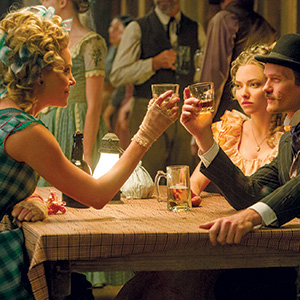

The maniac Elliot Rodger was, as they say, “cinema literate.” As has been noted, he’s the son of the second unit director of an obviously feminist movie, the first adventure of Katniss Everdeen. Somehow the work didn’t reach him. Washington Post critic Ann Hornaday cited Neighbors as an exemplification of the kind of dickweilding cinema that insists every backward shy man deserves a classic hottie.
Seth Rogen, or one of his people, skimmed the piece, and decided the article was accusing him of fomenting the Isla Vista killings. Thus Rogen’s many fans unleashed the now familiar Twit-storm.
Oddly, Hornaday’s original Post review of Neighbors was free of foreboding and pleasure alike. It was the kind of article even the most dedicated critic ends up writing sometimes, condensable as “It’s the sort of thing you like if you like this sort of thing.” She may have been wrong in target but she was right in emphasis: certainly, the American cinema of 2014 is a cesspool of sexism.
Seth MacFarlane‘s rotten Oscar performance hangs over the reception of A Million Ways to Die in the West. He’s Albert Stark, incompetent Arizona territory sheep rancher, an 1880s version of the boomerang kid living with hateful parents. (“I’m not the hero, I’m the guy in the crowd making fun of the hero’s shirt.” ) After the public humiliation of wiggling out of a gunfight, he’s dropped by his girlfriend Louise (Amanda Seyfried) during a creekside picnic of cheese cubes, ciabatta and salami. Louise takes up with the hilariously snide, fussily mustached Neil Patrick Harris, the town’s tonsorial parlor operator. Hurt, Albert seeks sympathy from his weedy bro, Edward (Giovanni Ribisi), and Edward’s girlfriend Ruth (Sarah Silverman) the town’s overbooked prostitute. During one of the regularly scheduled saloon fights, Albert accidentally saves the life of a bystander (Charlize Theron)—a gunwoman temporarily separated from her husband, the infamous robber Clinch Leatherwood (Liam Neeson).
The film’s been getting pasted—guilt by association with bro-culture. Personally, I brayed for it. Complaints of a slow pace seem less valid when Million aspires to be a classic Western with impressive visual quality (it’s good looking from the first drone-copter shots of Monument Valley); Joel McNeely’s music honors the Elmer Bernstein tradition. The sight of Theron hatted and on horseback is as sweetly tranquilizing as the scent of alfalfa.
Million transforms the as-flies-to-wanton-boys sequence in the opening of Once Upon A Time in the West, and changes it to the whine of a city person thwarted by slow public transit, rudeness and cold coffee. Death is in every tumbleweed, violence ready to strike in every form, from bad snakes to unaccountably angry Indians. (Albert doesn’t understand the restless natives: “We split the country with them 50/50.”). Baroque slapstick, out of nowhere, adds to the body count: people have been getting hit by bricks in the comedy cinema for a century, but MacFarlane owns the record for clobbering someone with the largest brick ever. Until the last 20 minutes—like Life of Brian, Million takes an inexplicable fantasy turn when it seems to be ready to resolve—the comic relief never wears out the dramatic relief, and vice versa.
It is low. It has authentic frontier humor, a gunfight sabotaged with a dose of salts. Come for the sheep whizzing in MacFarlane’s oddly Kevin Spacey-like face—we’re even now for “We Saw Your Boobs.” Stay to see Theron handling a battering husband rather aesthetically. Neeson, who has been spoofing his iron-testicled roles, slaps on a gorgeous look of sham-hurt on his face as he offers his angry wife a daisy. It’s the meme of tomorrow.
Hornaday might have wanted to congratulate male comedians when they’re at last making room for women, and yet Million still gives you some creeps in the film’s insistence that the discarding girlfriend Louise needs to be told off, and more than once. A bully-streak emerges, and it’s reiterated when Ruth grosses out her virgin boyfriend with the sight of her vagina.
The enrapturing Silverman, whose resemblance to a Disney chipmunk amplifies her choice of shock material, may have suggested this gag herself. A really gorge-rising racist joke gets handsomely avenged after the end titles (thanks to a fast cameo by a well-known actor). It’s the sexist one that goes unredeemed; you keep hoping the comedy bros of today will give female plumbing the same kind of awe they lavish on their own.
A Miillion Ways to Die in the West
116 MIN.; R



